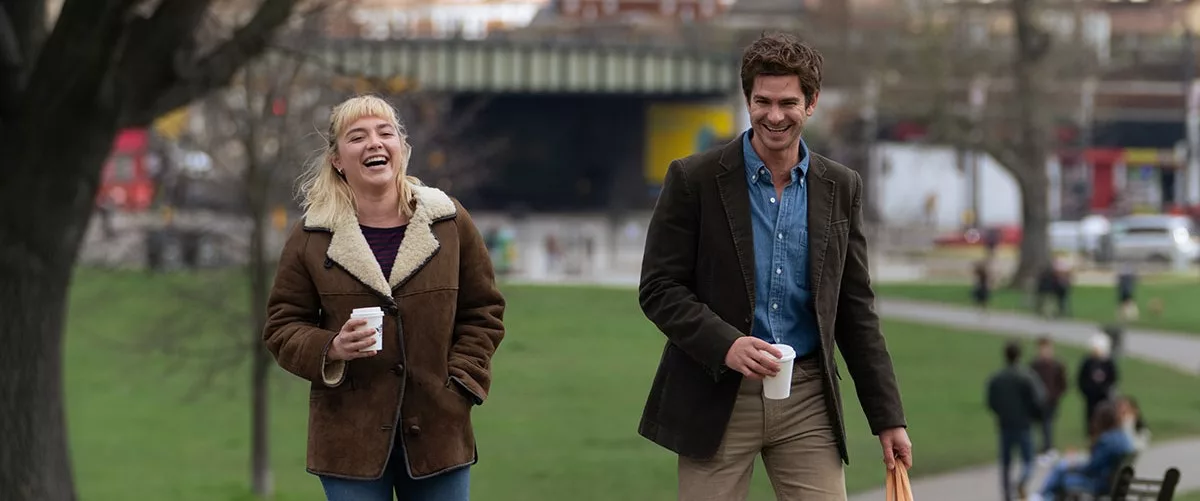
Andrew Garfield could have chemistry with a shoe. This has been patently obvious during his press tour/charm offensive for We Live In Time (dumb title alert!), during which he has brazenly flirted with both co-star Florence Pugh and, perhaps even more famously, Chicken Shop Date host Amelia Dimoldenberg, with whom he has enough will-they-or-won’t-they chemistry to power a small village. To make hearts flutter even more, he talked to Sesame Street’s Elmo about grief—Garfield recently lost his mother—in a way that was both wise and tender (“sadness is kind of a gift”). Stop being so perfect, Andrew!
None of this is intended to short shrift Pugh, who is an absolute delight—a singular talent and earthy beauty who has rightly taken Hollywood by storm. Girl is no slacker in the charm department herself.
So it is with some disappointment that I tell you that We Live In Time lives up to its dopey name. It’s muddled and half-baked, even though the two actors give it their all and, yes, do convince us they’re an actual couple.
Here’s the basis of the title: We are all shaped by our past, cleaved to our present, and unaware of our own future, the film argues, and only when we see all three at once do we get the full measure of a life. Not exactly revelatory stuff. Director John Crowley and writer Nick Payne toggle back and forth between Garfield’s Tobias and Pugh’s Almut at various stages of their relationship. One minute they’re an established couple with a daughter, Ella. One minute they are meeting (not-so) cute when Almut runs Tobias over with her Mini Cooper. One minute we are finding out that Almut’s cancer has recurred, although we didn’t know she had cancer to begin with.
All this is fine. I mean, I didn’t find it especially confusing, as some have complained, although Garfield looks exactly the same throughout—same fabulous head of tousled hair, same concerned face, same wire-rimmed glasses that he trots out to look extra emo. They could’ve at least given him a goatee or a haircut or something to help us navigate the timelines. (Thanks to chemo, Almut occasionally has a shaved head.) But it doesn’t really add anything to the film. I didn’t learn much more about the couple or their motivations because of the shifting timeline—if anything, it felt like a bit of a cop out. Just when things start to go below surface level, poof, we’re in a new year!
Also, the film has been falsely advertised to a certain extent. It’s not a story about Tobias and Almut so much as a story about Tobias reacting to Almut. She’s at the center of the film: her pain, her willfulness, her triumphs, her choices (or lack thereof). All Garfield has to do is look at her—at various points moist-eyed, adoring, befuddled, and, yes, concerned.
This is a bit of a gender reversal, I suppose. In most films, it’s the woman who is forced to be “put upon” and “long-suffering” as the husband, our hero, goes off and commits various acts of derring-do. But it’s a telling gender reversal because Almut doesn’t go on adventures: she gets cancer and has a child, all while guiltily navigating a career as a star chef.
Early in their relationship—too early, perhaps—Tobias tells her that he wants to have children and that her stated uncertainty on the matter could be a dealbreaker. She lashes out, cursing at him, telling him he’s putting a lot of unnecessary pressure on her. (Facts.) Their relationship progresses, but when she gets her first cancer diagnosis, she has to choose between a complete hysterectomy (meaning no chance of getting pregnant) or a partial one, which would be riskier but allow her to conceive. She chooses the latter and the film makes sure we know this was her decision . . . but was it? He’s the one who really wants kids.
Mixed in, we have lots of cozy, classic British rom-com scenes—Almut teaching Tobias to make eggs (you crack them on a flat service, she instructs); the two of them on bumper cars; the two of them getting it on in candle-lit rooms; scenes of smelling herbs and lemons in their painfully quaint garden; the obligatory scenes of Almut peeing on a stick as Tobias watches, concerned, until the happy pregnancy news comes through, etc.
The big conflict of the film has to do with Almut secretly entering international cooking competition Bocuse D’Or when she should be home resting during her cancer treatments. Her logic: If she’s going to die, she wants Ella to remember her for doing something great. But the film itself is ambivalent about this decision—one day, Almut’s so distracted by the menu preparation she leaves Ella waiting outside school in the rain. Is this a moment of female empowerment or a selfish choice by a mother who doesn’t quite love her daughter enough? The film isn’t sure. (But kinda, secretly, deep down thinks she’s a Bad Mom ™.)
In one of the timelines there is a brilliant set piece involving Almut giving birth in a “petrol station” bathroom (hey, it’s England). It’s an extremely funny and touching scene—both Garfield and Pugh act the shit out of it—but it fits in with my overall concern about the film. Garfield’s Tobias wants a child and Almut eventually agrees. But it’s not Tobias on the dingy floor of that station, hands gripping the sink, pushing for dear life.
